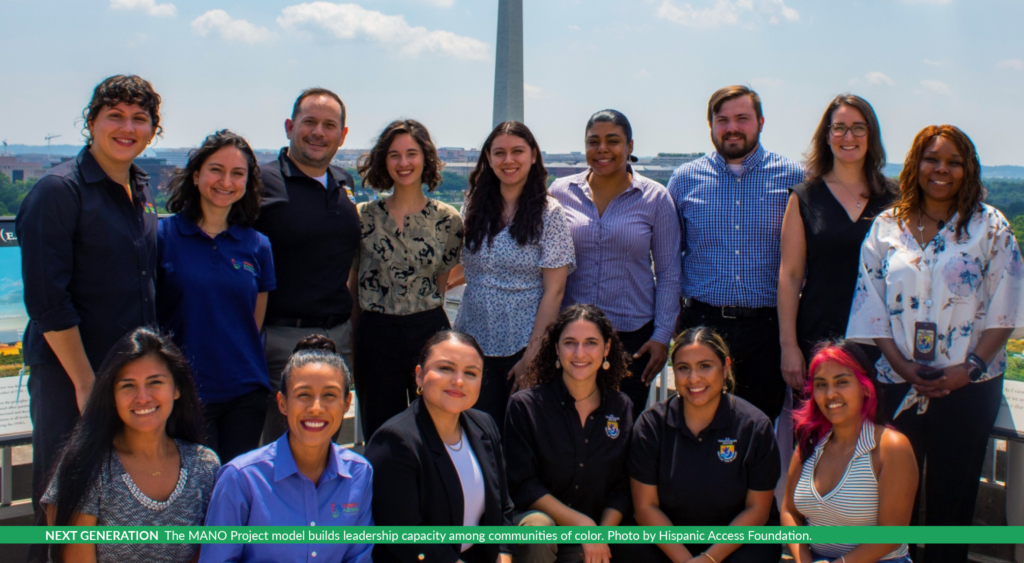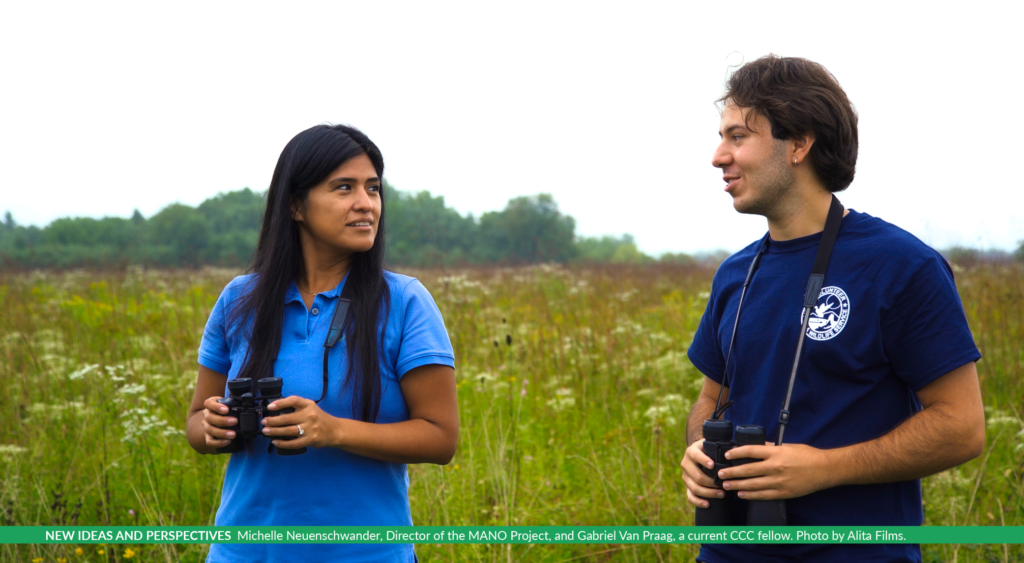Last updated on February 10th, 2025

“Eventually, climate change will affect all of us, because climate change doesn’t discriminate. We need to prepare ecosystems. A call to action that is not only driven by our personal gain, but more so for providing a sustainable future for generations to come.”
Gabriel Van Praag, Civilian Climate Corp Fellow, MANO Project
The Latino community lives at the heart of the climate crisis– Latinos are twice as likely to be affected by wildfires, three times more likely to die from heat exhaustion on the job, more likely to live in hotter neighborhoods, more likely to live in areas exposed to flood risks, less likely to have their neighborhoods protected from sea level rise, and more likely to suffer health problems after a flood. Moreover, Latinos and other communities of color also face the nature gap– a disproportionate lack of access to parks, waterfronts, and other green and blue spaces. In addition to supporting public health, these spaces provide economic, educational, and climate resilience benefits to the surrounding communities. With 75% of Latinos saying that climate change is either a crisis or a very serious problem, more are willing to take action within their communities.
Impassioned for change, in 2010 Maite Arce created the 501(c)(3) non-profit Hispanic Access Foundation. With a clear vision, her motive was to unite her community and their environmental interests in hopes of creating a more equitable society. Meanwhile, the U.S. Census estimates that the Hispanic population will nearly double by 2050 to more than 100 million Latinos. With the knowledge of changing demographics, there is a growing need to engage the passion that young Hispanics have for environmental advocacy and conservation. As a result, Hispanic Access launched the My Access to Network Opportunities (MANO) Project. The MANO Project strives to connect and build young leaders of color to protect public lands and create equitable and just climate change strategies.

The MANO Project’s model builds leadership capacity among communities of color and the nation as a whole. We do so by building trusting relationships with organizations and federal agencies to provide professional development and training opportunities for college students and graduates. Our current partnerships include: the Bureau of Reclamation, Colorado Parks and Wildlife, National Park Service, U.S. Fish and Wildlife Service, and the U.S. Forest Service. A special feature of the MANO Project is that all internships are paid, allowing low-income individuals the opportunity to enjoy a leg up in their careers they otherwise could not afford. In the words of Fernando Lara, a first-generation college student who worked his way through school, “Before learning about the MANO Project, I saw similar internships. However, they were unpaid, and I couldn’t participate because I wouldn’t have had time to do the internship, work, and still go to school. Thankfully, MANO’s paid internship paved the way for me to get into a field I’m passionate about without the burden of wondering if I was going to be able to pay the rent.”

In addition to advocating for positions with liveable wages, the MANO Project administers a comprehensive framework to support workforce functions where current federal workforces fall short. This includes promoting a pathway of access for minority students and recent graduates to participate in an equitable recruitment and selection process. Once program hours have been completed, many interns qualify for certificates that offer a Direct Hiring Authority (DHA) status. This status opens up access to full-time employment within the federal government, helping America reach climate goals with a stronger, more diverse workforce. To date, more than 450 alumni have participated in our various internship programs. Most recently, the MANO Project has partnered with the U.S. Fish and Wildlife in 2021 to debut the Civilian Climate Corps Fellowship Program (CCC), the first of its kind in providing young professionals an opportunity to be on the leading edge of the climate change fight by aiding the National Wildlife Refuge System’s (NWRS) response to climate mitigation and adaptation. These strategies will yield high impacts, such as ensuring that carbon already sequestered in our National Wildlife Refuges remains locked in trees and other vegetation, while providing an opportunity to explore restoration activities that help draw additional carbon dioxide from the atmosphere.

Historically, the decision-making process in the field of conservation has left minorities and vulnerable communities out of the conversation. Despite growing diversity in the United States, the racial composition of environmental institutions has remained between 12% to 16%. Currently, the demographic makeup of most U.S. environmental organizations does not reflect that of the country as a whole. The MANO Project aims to change that by increasing the representation of historically underrepresented groups within conservation careers by creating a pipeline for them to get hired by environmental agencies and organizations. We are effectively enabling opportunities for substantial professional development within diverse cultural resource projects for students of color who not only overwhelmingly support the preservation of our parks and public lands, but also are capable of engaging their communities. This allows for new ideas and perspectives to become key aspects of an equitable fight against climate change.
“When we think about conservation and the environment, what first comes to mind are images of sweeping plains and mountains, untouched by people,” says Nina Marti, Program Manager for the MANO Project. “What’s missing from that narrative, and how we respond to climate and environmental crises, are the ways in which people of color have established relationships with nature; how generations of Indigenous peoples have cared for this land, how enslaved and exploited peoples have cultivated this land, and how we integrate green space into urban areas. These narratives offer insights on how we can shape our relationship with nature and the climate for the better, but we can’t learn from them or integrate them until the keepers of those stories and practices are afforded equitable opportunities in their fields.”


As climate change continues to affect the day to day lives of our communities, federal land agencies, with the help of the current administration, have committed to confront the crisis through climate readiness integration in their mission and programs. While each agency has its own speciality and focus, each has a crucial part to play in combating climate changes.
The U.S. Fish & Wildlife Service’s 2021 launch of the 18-month fellowship program for the newly reintroduced Civilian Climate Corp (CCC) program is an exciting example of how government agencies can support climate adaptation efforts. As part of President Joe Biden’s American Jobs Plan, the CCC program hired young Americans to work on combating the climate crisis within the National Wildlife Refuge System (NWRS). Such roles are crucial, as one study estimated, 17 gigatons of carbon are currently stored on America’s NWRS. By developing and refining a climate adaptation framework, which utilizes existing plans, data on climate change and other stressors, ecological transformation, and a structured decision-making process, their work informs how Refuges will address climate change. Implementing this framework is a win-win opportunity. It protects existing carbon stores, while also allowing refuge managers to implement strategies, like native vegetation plantings, that help draw additional carbon from the air.

“The NWRS is on the front-lines of climate change,” said Cynthia Martinez, Chief of the NWRS. The CCC enlists the next generation to utilize new ideas and perspectives, ensuring a sustainable future for all. The MANO Project is committed to ensuring these, and future roles remain open to communities of color. “Engaging young people in diverse communities to be at the front and center of addressing the climate crisis is one of the MANO Project’s core goals,” said Michelle Neuenschwander, Director of the MANO Project. “Our work is about the next generation of Latino leaders. This unique experience provides extensive training, mentoring and professional development to ensure students have the tools and knowledge needed to excel in their fellowship.”

“The CCC is unique in its programming, but could be used as an example for other agencies,” says Crystal Strong, Program Associate for the MANO Project. “As needs for climate adaptation continue to take center stage, so do needs for jobs that tackle the larger issues at hand. As programs and positions are created, The MANO Project will continue to advocate for future opportunities to be accessible to diverse students and graduates. These internships and fellowships are monumental to opening pathways for full time employment within these agencies.” In the words of Gabriel Van Praag, a current CCC fellow, “The MANO Project gave me the opportunity to be on the leading edge of the fight for climate change adaptation. I hope to keep working in this field for the rest of my life. I really hope that I can reduce climate change, but also make the process equitable and just.”
In addition to the CCC, the US Forest Service (USFS) and Hispanic Access Foundation have partnered to support the next generation of conservation and environmental stewards through the Resource Assistant Program (RAP). This partnership aims to build a strong community of inspired, skilled, motivated leaders through substantial work experience and building skills required for success in natural resource careers. RAP fellows are placed at USFS national forests and offices throughout the U.S. and support the mission to care for the land and serve the people. Interns are introduced to various tasks and projects such as: lands management, conservation education, resource interpretation, and rehabilitation activities through their assignments on public lands across the country. RAP projects bring fellows in direct contact with climate impact work through assignments in fire management, forest restoration, wildfire prevention and air quality management. An inspiring example of one of our interns doing so is Valery Serrano. A first-generation Latina, Valery Serrano, is a current MANO Intern with RAP stationed at the San Juan National Forest in Colorado. Through this program, Valery is pursuing the career of her dreams by working with wildlife and assisting wilderness and fire crews in educating the public on fire safety in the National Forest.


The U.S. Office of Personnel Management (OPM), the chief human resources agency for the federal government, has made workforce data for the federal civilian workforce available through a tool called Fedscope. The most recent diversity data trends for June 2022 demonstrate ample room for growth for minority groups in Science and Engineering occupations within the federal government. In Science occupations (Natural Resource Management, Biological Sciences, Environment Protection, Soil Conservation), 26% of current employees identify as a minority, and in Engineering occupations (Environmental, Civil, Electrical, Nuclear) 28% of current employees identify as a minority. Since its creation in 2015, the MANO Project has grown from offering one program encompassing a handful of internships to about 200 interns across 17 different national programs. At this stage of growth, we would like to expand into private and NGO sectors to diversify our opportunities, broaden access to environmental careers, and influence the field beyond the government sector. The MANO Project will continue to support programs like CCC and RAP that specifically work to target climate mitigation and adaptation. We will continue to encourage climate mitigation organizations to allocate resources to diversifying their own workforces so as to create meaningful dialogue around and solutions to climate crises.
Learn more about Hispanic Access Foundation, the MANO Project, and its fellowship programs at hispanicaccess.org and manoproject.org. Don’t see an internship fit? Get notified when we add new opportunities throughout the year when you sign up for alerts. For inquiries regarding partnerships, please email info@hispanicaccess.org, or fill out our inquiry form.
Article contributors:
MANO Project Program, Hispanic Access Foundation
Conservation Program, Hispanic Access Foundation
Communication Program, Hispanic Access Foundation
Gabriel Van Pragg, Civilian Climate Corp Fellow, MANO Project
